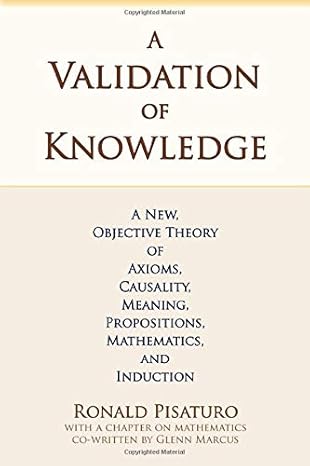This book attempts to give a validation of all our knowledge, a proof of how we know it, and it may have succeeded. I would compare Pisaturo’s project to that of Descartes’ Meditations. To validate all knowledge, Pisaturo starts over, not reasoning from any piece of knowledge until he has proven it. Unlike Descartes however, Pisaturo does not base his chain of reasoning on deduction from “clear and distinct truths” (assumptions drawn from intuition); Pisaturo’s logical order of development is inductive. By inductive, I mean two things: 1. He recognizes that all content of human cognition comes from sense experience; as a result, in order to start philosophy from the beginning, he chooses to start with basic observations from sense experience which do not rely on prior ideas. 2. That, as he develops his argument step by step, he proceeds in a logical order, each new argument being based only on what can be drawn from direct sense experience and on premises which have been proven earlier in the book from direct sense experience. This is the first serious attempt I am aware of to validate our knowledge inductively. The philosophy of Objectivism is an inductivist philosophy, but the comprehensive statement of that philosophy, “Objectivism, the Philosophy of Ayn Rand” (OPAR) does not proceed in an inductive order. Instead, OPAR proceeds in the order of a conditional hierarchy, starting with the broadest principles first and showing how each of those ideas condition the narrower principles. This is not a flaw of OPAR, but a difference in purpose. Such an order allows students to understand Objectivism as an integrated whole. However, such an order does not give a fundamental proof, or inductive validation of its contents. Pisaturo’s book does attempt this. If successful, it will provide an excellent companion to OPAR: OPAR giving a top down structure, allowing us to see the philosophy as an integrated system, and Pisaturo’s work serving as its inductive proof.
Addressing Skepticism:
The objectivist reader will be properly skeptical of several aspects of this book, including the use of mathematics and probability to express epistemic claims. I have not fully made a judgment on these issues, but in the meantime I will say that Pisaturo develops these ideas in a way that are not obviously susceptible to the typical objections objectivists will raise on these issues. I encourage the reader to consider the details of Pisaturo’s development before dismissing the book on such grounds. Pisaturo is an experienced student of objectivism, is aware of these issues, and developed his claims with these issues in mind. Interesting Features:
Pisaturo has a theory of propositions which is a natural extension of Ayn Rand’s theory of concepts. It takes Rand’s basis for the objectivity of concepts and applies it to propositions. This is a part of the book I am already convinced of. It is a fundamental insight and I think it will have many fruitful applications. Pisaturo gives us a method for handling risk in induction. Even when we have epistemic certainty on a given issue; say that all the evidence seen so far shows us that a given medical treatment is safe and effective, additional factors can still be discovered which require us to update our knowledge. For example, it might be discovered later that 1% of the population has some traight that reacts negatively to the treatment. Objectivism teaches us that before evidence of such a factor is present, the claim that “maybe this treatment will kill you” is arbitrary, there is no evidence for it. While this is true, it is important to keep in mind that in such cases, new factors do surface even when there was no evidence of them before. Pisaturo’s n/(n+1) method gives us an epistemic standard for quantifying the probability of such new factors surfacing, thus giving us a way of epistemically dealing with them. I have not decided if I agree with this standard yet, but if valid it gives us a new epistemic tool that Objectivism does not offer us. This work has many more interesting features which I will briefly mention: a characterization of quantitative characteristics, an induction of the rudiments of mathematics, an identification of the axiom of mathematics, a unique explanation of Rand’s theory of concept formation, an identification of how man exerts large forces, and many more things I have yet to fully understand. All of these items are developed in a logical order, each item laying the foundation required to argue for the next.
Concluding Remarks:
I am unsure if this book ultimately achieves its task of validating knowledge. I will do a more thorough review of it once I read it a second time and make that evaluation. But in the meantime I can confidently say this: we need a book like this, we need a book which gives the basic validation, the argument for how we know what we claim to know, and this book attempts to give that validation in an inductive, logically ordered argument.
